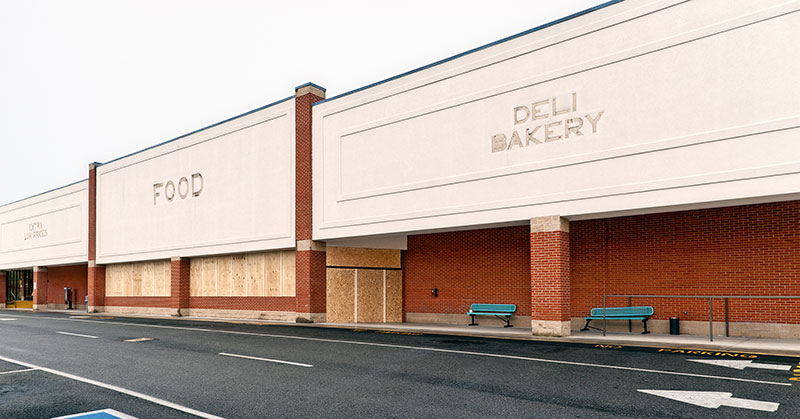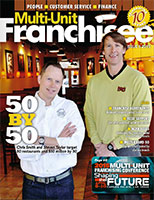Failed Units: Not Just a Franchisee Issue

Throughout my career I have observed that a strong alignment of interests between two business parties usually leads to good outcomes for both. All franchisors with any marketing savvy will say they are strongly aligned with their franchisees. What is the evidence that a brand walks the talk?
There are many ways a franchisor can help its franchisees, starting with a full and high-quality support program, and including a disciplined prospect screening program, training that measures results, site selection and opening assistance based on proven criteria, and field operations and compliance that are effective.
Then there's transparency. Brands that have a meaningful Item 19, that have system dashboards that compare unit performance in real time, that support capital access through SBA eligibility and Bank Credit Reports (BCRs), and that seek system feedback through independent third parties are further examples. Brands that "get it" tend to not only focus on these types of operational performance measures, but actively compare how they are doing against peers. At FRANdata, we benchmark best practices in these areas all the time.
In an absolute sense, all these indicators are aimed at a pretty simple concept: unit success or failure. Over the long term, the only reason a unit will stay in business is because it is profitable. While we tend to acknowledge the financial impact on franchisors of a failed unit, we rightfully focus mostly on the impact on the franchisee.
After all, for most single-unit franchisees the cost of a failed unit is absolute and often devastating. It can represent the loss of a business, the loss of most of a franchisee's personal net worth, the loss of their main source of income and job, the likely loss of other jobs, and the resulting impact on many families. For multi-unit franchisees, the cost of a failed unit usually isn't quite as devastating personally or financially, but it is real and negatively affects people.
The obvious impact on the franchisor is a loss of royalty revenue. A franchisor has made an "investment" in finding, training, and supporting a franchisee as well as assisting in siting and opening a new unit. In our comparative research on operations for brands, we have found that the sunk cost incurred by a franchisor varies widely and can be a significant multiple of the net fees obtained up front. Those up-front costs put unit breakeven for many franchisors more than two years out when compared with the unit royalty ramp-up.
We also have found that most new franchise units hit breakeven in a 12- to 24-month time frame, based on our BCR data. From many years of providing brand credit analysis for lenders, we also have tracked the time from funding to loan failure (loan failure and unit failure are correlated, but not as highly as is generally thought). The significant rise in the loan failure bell curve starts after two years, about the time most franchisors have recovered their fixed costs in a unit and are beginning to realize a net return. Put all this together and it certainly creates an alignment of interest between franchisors and franchisees.
However, this is a very limited and short-term assessment of the cost of a failed unit to the franchisor. An under-qualified franchisee prospect requires more support. A weak site selection program lengthens the time to unit breakeven. An underperforming unit takes more field support time. A struggling unit requires the time and attention of franchisor staff, and often management time. An underperforming franchisee almost always has an impact on other franchisees, often leading to system culture issues. A failed unit creates consumer brand perception issues, and a failed franchisee often creates negative social media and even traditional media issues.
Where or not a franchisee fails, a closed unit is a big negative to the lending community. Just a few closures can result in lenders staying away from those brands. At the very least, it affects the terms lenders are willing to offer. Through our analysis of performance we have found that, when measured over enough time, a historical unit success rate serves as a good medium-term predictor of future performance outcomes. We are currently incorporating this metric in credit rating products for lenders and it is being well received.
This brings us back to the alignment of interests. Wouldn't brands that grasp a fuller concept of unit/success implications at all three levels--franchisor, system, and franchisee--be the brands that will have the most success? An important question that both prospective franchisees and multi-unit franchisees should ask is, Which brands exhibit the best understanding of this concept? Our research projects with franchisors are leading us to develop performance standards that measure the full cost of a failed unit and analysis of the causes. With such an understanding, franchisors should more efficiently allocate their human as well as financial resources. The result for franchising will be fewer failures, a stronger business model, and above-average brands with some serious marketing bragging rights.
Darrell Johnson is CEO of FRANdata, an independent research company supplying information and analysis for the franchising sector since 1989. He can be reached at 703-740-4700 or djohnson@frandata.com.
Share this Feature
Recommended Reading:
Comments:
comments powered by DisqusFRANCHISE TOPICS
- Multi-Unit Franchising
- Get Started in Franchising
- Growth
- Operations
- Open New Units
- Leadership
- Marketing
- Technology
- Legal
- Awards
- Rankings
- Trends
- Featured Franchise Stories
FEATURED IN

Multi-Unit Franchisee Magazine: Issue 2, 2015
$125,000
$150,000




 The multi-unit franchise opportunities listed above are not related to or endorsed by Multi-Unit Franchisee or Franchise Update Media Group. We are not engaged in, supporting, or endorsing any specific franchise, business opportunity, company or individual. No statement in this site is to be construed as a recommendation. We encourage prospective franchise buyers to perform extensive due diligence when considering a franchise opportunity.
The multi-unit franchise opportunities listed above are not related to or endorsed by Multi-Unit Franchisee or Franchise Update Media Group. We are not engaged in, supporting, or endorsing any specific franchise, business opportunity, company or individual. No statement in this site is to be construed as a recommendation. We encourage prospective franchise buyers to perform extensive due diligence when considering a franchise opportunity.